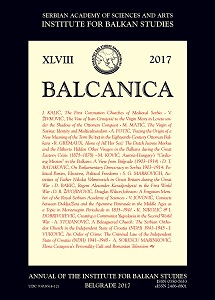Tracing the Origin of a New Meaning of the Term Re‘āyā in the Eighteenth-Century Ottoman Balkans
Tracing the Origin of a New Meaning of the Term Re‘āyā in the Eighteenth-Century Ottoman Balkans
Author(s): Aleksandar FotićSubject(s): Social history, 18th Century, The Ottoman Empire
Published by: Balkanološki institut - Srpska akademija nauka i umetnosti
Keywords: ottoman empire;balkan;non-muslims;eighteenth century;
Summary/Abstract: Besides its usage with the primary meanings: 1) social status; 2) subjectship, the term re‘āyā was used to denote, as many historians tend to claim, “only non-Muslim subjects” from “sometime” in the second half of the eighteenth and in the nineteenth century. The paper demonstrates that this meaning of the term re‘āyā had already been in use since the first decades of the eighteenth century, and not to the exclusion of but along with other meanings. More frequent replacement of the neutral shari‘a term zimmī(ler) and the usual official term kefere with the word re‘āyā should be considered a consequence of structural social change taking place in the same century
Journal: BALCANICA
- Issue Year: 2017
- Issue No: 48
- Page Range: 55-66
- Page Count: 12
- Language: English

